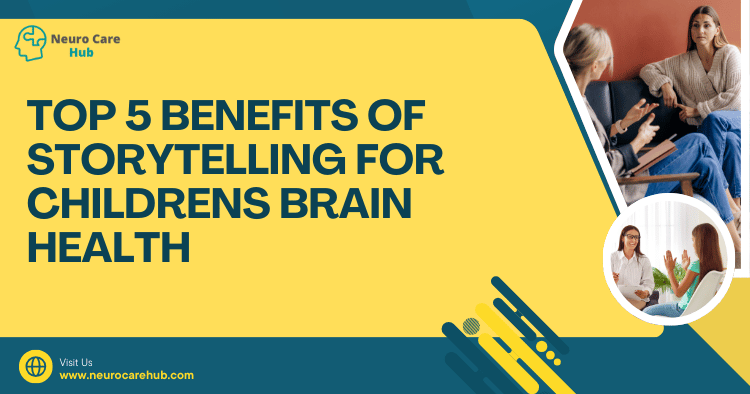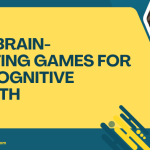Table of Contents
- Introduction
- 1. Enhances Cognitive Development
- 2. Boosts Language Skills
- 3. Fosters Emotional Intelligence
- 4. Encourages Creativity and Imagination
- 5. Strengthens Memory and Retention
- Conclusion
- FAQs
Introduction
Storytelling is an age-old art form that has captivated audiences across generations. From ancient folklore to modern children’s books, stories have been a fundamental part of human culture. For children, storytelling is not just a source of entertainment; it plays a crucial role in cognitive growth and brain health. In this blog post, we’ll explore the top five benefits of storytelling for children’s brain development.
1. Enhances Cognitive Development
Cognitive development refers to how children think, explore, and figure things out. Storytelling stimulates multiple areas of the brain, strengthening neural connections and enhancing cognitive functioning.
Research shows that when children engage with stories, they are exercising their critical thinking skills. Listening to narratives encourages them to predict outcomes, understand cause and effect, and analyze characters’ motivations. This engagement enhances problem-solving skills, making it easier for them to tackle real-world challenges.
For instance, a study from the National Association for the Education of Young Children (NAEYC) highlights the importance of storytelling in developing children’s reasoning and comprehension skills.
Visual Element: Cognitive Development Table
| Cognitive Skill | How Storytelling Helps |
|---|---|
| Critical Thinking | Encourages predictions and analysis |
| Problem-Solving | Presents challenges and resolutions |
| Comprehension | Boosts understanding of narratives |
2. Boosts Language Skills
Language development is crucial during the early years of a child’s life. Storytelling introduces children to new vocabulary, sentence structures, and language patterns. When children hear stories, they are exposed to rich language that enhances their verbal skills.
Moreover, storytelling often involves repetition, which reinforces language learning. When children hear a story multiple times, they begin to recognize words and phrases, improving their ability to communicate effectively.
According to the American Academy of Pediatrics, reading to children and engaging them in storytelling can lead to significant improvements in language development, setting a strong foundation for future literacy skills. For more insights on effective communication strategies, refer to Top 5 Essential Insights on Neuro Care You Need to Know.
3. Fosters Emotional Intelligence
Emotional intelligence is the ability to understand and manage one’s emotions while also empathizing with others. Storytelling is an excellent way to teach children about emotions, both theirs and those of others.
Through the characters and situations in stories, children learn to identify feelings and develop empathy. For example, when a child hears about a character facing challenges, they can relate and understand the emotions involved, which helps them process their own feelings.
A study published in the journal Child Development found that children who engage with stories displaying a range of emotions are better equipped to handle their emotional landscape. This emotional literacy is crucial for forming healthy relationships and managing social interactions. You can also explore how family support enhances emotional development in Top 5 Ways Family Support Enhances Neuro Recovery.
4. Encourages Creativity and Imagination
Storytelling is a gateway to a world of possibilities. It encourages children to think creatively, envisioning characters, settings, and plots beyond their immediate reality. This imaginative play is essential for cognitive flexibility, allowing kids to adapt their thinking and approach problems from different angles.
When children hear or create stories, they are inspired to invent their own narratives. This creative expression not only enhances their imagination but also fosters a sense of autonomy and confidence in their ideas.
Research from the Journal of Creative Behavior indicates that children who engage in storytelling are more likely to develop strong creative skills, which are invaluable in many aspects of life, from academics to personal relationships. For more on enhancing creativity, check out Top 5 Lifestyle Changes for Better Neuro Health.
Visual Element: Creativity and Imagination Table
| Creative Skill | Storytelling Impact |
|---|---|
| Imagination | Encourages envisioning new worlds |
| Problem-Solving | Fosters flexible thinking |
| Self-Expression | Boosts confidence in sharing ideas |
5. Strengthens Memory and Retention
Engaging with stories helps enhance memory and retention in children. The narrative structure of a story provides context and meaning, making it easier for children to remember information.
When children listen to a story, they create mental images and connections that aid in recalling details. This process not only improves their ability to remember specific stories but also enhances overall memory skills, which are critical for academic success.
A report from the National Institute for Learning Outcomes Assessment emphasizes the link between storytelling and memory retention, showcasing how narrative techniques can be used as effective educational tools. For further insights into how early intervention can influence cognitive abilities, see Top 5 Benefits of Early Intervention in Neuro Care.
Conclusion
Storytelling is more than just a pastime; it is a vital component of children’s cognitive growth and brain health. From enhancing cognitive development to fostering emotional intelligence, the benefits of storytelling are manifold. Encouraging storytelling in daily life can significantly contribute to a child’s overall development and preparedness for the challenges ahead.
FAQs
Q: How can I incorporate storytelling into my child’s daily routine?
A: You can read books together, create stories based on their day, or ask them to narrate their favorite experiences. Audiobooks and storytelling podcasts are also great options.
Q: What age is appropriate for introducing storytelling?
A: Storytelling can begin as early as infancy. As children grow, you can introduce more complex narratives and encourage them to participate in story creation.
Q: Are there specific types of stories that are better for development?
A: Stories that include diverse characters and scenarios can provide rich learning experiences. Fables, fairy tales, and culturally diverse tales are excellent choices.
For more insights on the significance of storytelling, you can refer to American Academy of Pediatrics and NAEYC.
By weaving storytelling into your child’s life, you’re fostering not only their brain development but also a lifelong love for stories and learning. Happy storytelling!






